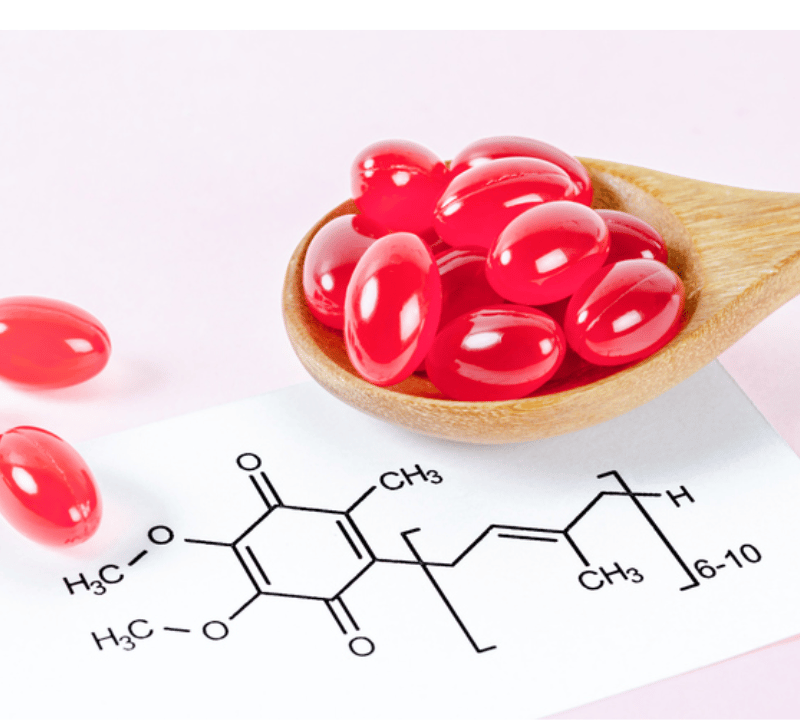Embarking on a journey towards improved health and wellness often leads us to explore the synergies and potential clashes between different dietary supplements. Coenzyme Q10, commonly known as CoQ10, is a potent compound lauded for its significant benefits, from bolstering heart health to enhancing energy production. Yet, the interplay between CoQ10 and other vitamins and medications invites a closer examination to harness its benefits safely and effectively. This article sheds light on a pivotal question: what vitamin should not be taken with CoQ10? The answer is more complex than a simple list, and understanding the nuances of CoQ10 interactions, particularly with Vitamin K, is essential for anyone looking to integrate this supplement into their health regimen.
CoQ10's multifaceted role in the body includes supporting heart function, managing blood pressure, and contributing to energy levels. It is a sought-after supplement for those dealing with conditions like congestive heart failure, high blood pressure, and even migraines. However, its beneficial effects can be dampened or complicated when combined with certain medications and vitamins, most notably Vitamin K. This is due to CoQ10’s vitamin K-like effects on blood clotting, which may decrease the effectiveness of blood thinners like warfarin. Moreover, while CoQ10 can synergistically enhance the antioxidant protection provided by Vitamin E and certain B vitamins, it is imperative to approach supplementation with a nuanced understanding of potential interactions, especially with blood thinners and diabetes medications. This article delves deep into the heart of these interactions, offering insights into safe supplementation practices that maximize health benefits while minimizing risks. Join us as we explore the critical balance in supplement routines, underscored by research and clinical trials, to guide you toward informed and healthful choices.
Key Takeaways
- CoQ10 may decrease the effectiveness of blood-thinning medications like warfarin due to its vitamin K-like effects; however, moderate consumption and careful monitoring are advised as interactions may vary.
- CoQ10 enhances antioxidant protection and immune function when combined with Vitamin E and B vitamins, potentially improving absorption and health benefits.
- While CoQ10 supplementation can be beneficial for managing certain chronic conditions and improving overall wellness, it’s important to consult healthcare providers due to potential interactions with medications such as blood thinners and diabetes drugs.
Navigating Vitamin Interactions with CoQ10

As you navigate the world of supplementation, understanding how CoQ10 interacts with various vitamins is critical. After all, optimizing heart health and energy production is akin to a finely tuned orchestra, where each player must be in sync. So, what happens when CoQ10 shares the stage with certain vitamins? Let’s explore the fascinating dynamics of these nutritional interplays.
The Cautionary Tale of CoQ10 and Vitamin K
Just as in any great story, there are cautionary tales to be told in nutritional supplementation. Such is the case with CoQ10 and vitamin K. This duo, despite their health benefits, may interact in a way that potentially affects blood clotting. Supplementing with CoQ10 might decrease the effectiveness of blood-thinning medications like warfarin, known as blood thinners, owing to its vitamin K-like effects. This raises the potential risk of adverse effects, particularly when combining high doses of both.
However, it’s worth mentioning that a trial in healthy adults found that combining CoQ10 with vitamin K did not alter blood coagulation parameters or vitamin K status. So, while it’s prudent to monitor Vitamin K-dependent clotting factors when combining high CoQ10 and vitamin K doses, the tale may not be as cautionary as it first appears. The key lies in moderation and careful monitoring.
Synergy Between CoQ10 and Vitamin E
On a brighter note, we turn to the remarkable coenzyme q10 and Vitamin E duo. These two nutrients, when combined, create a powerful synergy that enhances antioxidant protection. Vitamin E significantly increases the absorption and blood levels of CoQ10, leading to a potent defense against oxidative stress. Experts suggest combining 100-200 mg of CoQ10 with 200-400 IU of vitamin E for optimal absorption and antioxidant protection. This combination is believed to enhance the benefits of both supplements.
This dynamic duo offers a promising approach to enhancing immune function and potentially improving exercise ability in conditions like multiple sclerosis. A shining example of nutritional synergy, the combination of CoQ10 and Vitamin E beautifully illustrates the power of collaboration for overall wellness.
B Vitamins: Boosting CoQ10's Benefits
Another noteworthy partnership is that of CoQ10 and B vitamins. These essential nutrients facilitate the conversion of CoQ10 to its active form, thereby enhancing its synthesis in the body. The result? Higher CoQ10 blood levels and improved absorption compared to taking CoQ10 alone. A 100 mg/day CoQ10 dose with a multivitamin containing B vitamins can double plasma CoQ10 levels.
This multivitamin not only enhances CoQ10 synthesis but also supplies the necessary B vitamins. So, if you’re considering adding CoQ10 to your supplement routine, don’t forget to invite B vitamins to the party!
Unveiling the Relationship Between CoQ10 and Other Supplements

Venturing beyond vitamins, it’s time to explore how CoQ10 interacts with other supplements. Just as a journeyman encounters various companions on his travels, so does CoQ10 meet different compounds on its path to promoting health. These interactions can significantly affect our wellness journey, ranging from synergistic to cautionary.
CoQ10 and Omega-3 Fatty Acids: A Heart-Healthy Combo
Let’s start with a heart-healthy duo: CoQ10 and omega-3 fatty acids. This combination supports cardiovascular health by offering a range of heart health benefits and aiding in cardiovascular function. Combining CoQ10 with omega-3 fatty acids enhances anti-inflammatory and antioxidant effects, both beneficial for cardiovascular health.
Moreover, CoQ10 may help lower blood pressure, an effect potentiated by omega-3 fatty acids, which enhance cellular energy production and offer protection against oxidative stress. So, while it’s crucial to ensure safe dosage levels when combining CoQ10 with high blood pressure medications, the overall heart-healthy benefits of this combo, including the potential to improve systolic blood pressure and prevent very low blood pressure, cannot be overstated.
When Statins Meet CoQ10: Managing Muscle Pain
Next, we encounter the meeting of CoQ10 and statins, a group of drugs commonly used to lower cholesterol levels. This relationship can be best described as a balancing act. On the one hand, CoQ10 can help manage statin-induced muscle pain, known as statin-induced myopathy. Evidence suggests that CoQ10 may reduce muscle pain caused by statins. However, research findings on its effectiveness have been mixed.
So, while CoQ10 may offer some relief, it’s critical to consult your healthcare provider before adding it to your routine if you’re on statin therapy.
Diabetes Medications and CoQ10: Monitoring Blood Sugar
Our journey also brings us to the intersection of CoQ10 and diabetes medications. Here, careful navigation is key. CoQ10 has the potential to slightly decrease fasting blood sugar levels, which could necessitate adjustments to diabetes medications to prevent the risk of hypoglycemia.
However, despite its potential influence on fasting blood sugar, CoQ10 does not seem to improve blood sugar control for people with diabetes. Given this complex dynamic, diabetic patients must consult their healthcare providers before combining diabetes medications with CoQ10 supplementation.
The Best Time to Take CoQ10: Enhancing Absorption
In the world of supplementation, timing is everything. And since CoQ10 is fat-soluble, it’s absorbed better with dietary fats. So, for optimal absorption, taking your CoQ10 supplement with a meal containing fats is recommended.
Consistent timing is also key, with peak plasma levels typically reached within 5 to 10 hours after oral administration of CoQ10. So, as you journey with CoQ10, remember the importance of timing and dietary fats to make the most of this powerful nutrient.
CoQ10's Role in Chronic Conditions and Drug Therapies

We’ve explored the interactions of CoQ10 with various vitamins and supplements, but what about its role in chronic conditions and drug therapies? CoQ10 can improve symptoms of congestive heart failure, potentially reduce blood pressure, and aid heart surgery recoveries. It has shown promise in patients with heart failure, diabetes, non-alcoholic fatty liver disease, and chronic kidney disease, including some conditions associated with cardiovascular disease and immune system dysfunction. CoQ10 supplementation may also aid cancer treatments by reducing inflammation and enhancing the immune response. However, it’s important to note that CoQ10 may decrease the effectiveness of anticoagulant medications like warfarin, which can increase the risk of blood clots. Individuals undergoing chemotherapy are recommended to consult their healthcare provider before taking CoQ10.
So, while CoQ10 offers potential benefits for those with chronic conditions, it’s crucial to consider its interactions with certain medications and various drug therapies.
How CoQ10 Contributes to Overall Wellness

Beyond its interactions with other nutrients and medications, CoQ10 is integral to our overall wellness. It acts as an electron carrier in the mitochondrial respiratory chain. It is a lipid-soluble antioxidant, protecting cells vital for immune system health. Moreover, supplementation with CoQ10 can enhance immune cell activity, potentially improving immune response during immunosenescence related to aging.
And let’s not forget the brain - combining CoQ10 with omega-3 fatty acids may support healthy brain function through their anti-inflammatory properties and positive effects on vascular tissues. While systematic reviews and clinical trials are still needed to establish optimal CoQ10 dosages for enhancing immune function and influencing overall wellness, it’s clear that CoQ10 holds a key role in our journey toward holistic health.
Personalizing Your Supplement Routine with CoQ10
As with any journey, the path to wellness is deeply personal. And personalizing your supplement routine with CoQ10 is no exception. Several factors come into play, such as absorption rates, proper dosage, and synergistic combinations with other key supplements.
Reduced forms of CoQ10 have been shown to achieve higher plasma concentrations and reach maximum concentration faster than commercial CoQ10 formulations. However, establishing the appropriate dosage is critical, as excessive intake may not provide additional health benefits and could even be harmful. Consulting with a healthcare provider is essential to personalize CoQ10 supplementation, especially when considering individual health goals and potential nutrient deficiencies.
For optimal synergy, consider including the following supplements alongside daily CoQ10 supplementation:
- A multivitamin with full Daily Value of B vitamins and vitamin E
- Omega-3 fatty acids
- Vitamin D
- Vitamin K2
- Probiotics
- Magnesium
These foundational dietary supplements can be combined with CoQ10 for most people.
To maximize the benefits of your personalized supplement routine, understanding the most effective sources of CoQ10 is crucial. Our article, 'Discovering What is the Best Source of Coenzyme Q10 (CoQ10) for Optimal Health,' delves into the various sources of CoQ10 and how they compare in absorption and efficacy. Feel free to click below to access that article here.👇
Wrapping Up Our Discussion on Combing Other Vitamins with CoQ10
Embarking on the complex journey of nutritional supplementation, CoQ10 emerges as a guiding light, illuminating the path to enhanced well-being. Its critical role in energy production and heart health and its potential to lower systolic blood pressure and improve exercise capacity positions it as an indispensable ally in the quest for wellness. Yet, the journey demands mindfulness, especially when navigating the terrain of supplement interactions. The confluence of CoQ10 with blood thinners, such as warfarin, necessitates a vigilant eye on blood clotting factors, underscoring the importance of professional guidance for those managing conditions like heart failure, diabetes, or high blood pressure. Furthermore, the integration of CoQ10 into one’s supplement routine calls for a personalized approach, attentively balancing absorption rates, dosages, and its synergistic potential with vitamins like E, D, and K2, as well as omega-3 fatty acids and magnesium, to tailor a regimen that resonates with individual health objectives and nutritional needs.
The selection process is paramount for readers poised to integrate this nutritional powerhouse into their health regimen. Our article, “From Heart Health to Energy Boost: Finding the Best CoQ10 Supplement for You,” serves as a beacon, highlighting five of the top CoQ10 supplements on the market. This resource is crafted to offer a head start in the selection process, providing insights into each option's relative bioavailability, efficacy, and additional health benefits. By aligning the choice of CoQ10 supplementation with personal health goals and the insights provided by clinical trials and research, individuals can navigate the landscape of nutritional supplements with confidence and precision, marking the beginning of a well-informed, healthful journey toward optimal wellness. You can add this article to your library here.👇
Frequently Asked Questions
What not to mix q10 with?
Do not mix Q10 with blood-thinning medications such as warfarin or clopidigrel, as it may make them less effective at thinning the blood. It's essential to consult your healthcare provider before taking CoQ10 if you are on blood thinners.
Why don't doctors recommend CoQ10?
Doctors don't recommend CoQ10 because it can make blood-thinning drugs less effective, increasing the risk of blood clots.
Can I take vitamin D and CoQ10 together?
You can take vitamin D and CoQ10 together as they have no apparent interactions and may benefit heart health.
Can CoQ10 help manage muscle pain caused by statins?
While CoQ10 supplementation can help with statin-induced muscle pain, its effectiveness is mixed, so it's crucial to consult your healthcare provider for personalized advice.
When is the best time to take CoQ10 for optimal absorption?
For optimal absorption, it is best to take CoQ10 with a meal containing dietary fats to enhance absorption, and consistency in timing is important.
Thanks for joining us in exploring this simple question: "What vitamin should not be taken with CoQ10?" We hope this discussion has helped clarify the proper path for you. Also, if you want to add to your library of knowledge, you should check out the other articles mentioned and linked above. It never hurts to add to your knowledge arsenal!
Please return soon to check out our next review of another incredible supplement – we’re always looking out for YOU!
*We are NOT qualified medical advisors. The content here is only based on our personal opinions and should NOT be used as a substitute for a healthcare professional's advice!











Member discussion